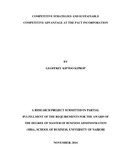| dc.description.abstract | The primary purpose of the study was to investigate on competitive strategies and sustainable
competitive advantage at the Pact Incorporation with specific objectives being to determine the
competitive strategies adopted by Pact Incorporation Kenya to achieve sustainable competitive
advantage and to identify the factors that influence development of competitive strategies at Pact
Incorporation Kenya. Competitive strategy is a management discipline, which focuses on the
organization's mission, searches for unique opportunities, determines whether they fit the
organization's strategic direction, defines the measures for success, and continually reassesses
opportunities. Pact Incorporation has undergone through eras of evolution and business development
as an NGO operating in an extremely competitive market. The study also revealed that resource based
view theory contributes a lot in strategy formulation as evidenced by the many different strategies that
have been implemented in the banking industry such as mergers and acquisitions, initial public offers,
branding and restructuring. The research design used was a case study since it is a one unit of analysis.
The study used interview guide to collect primary data. Interview guide was used to interview Country
director, public relation director, Finance director, Human resource director, Human rights program
manager, M & E manager, Peace building program manager, Research/Capacity Building manager,
Awareness Rising/Advocacy manager, Natural resource program, Grants manager and Finance manager.
The qualitative data was done using content analysis. The study found that competitive forces and the
context within which a company operates, choice of strategy can indeed seem like a search for a myriad
forces pushing and pulling an organization to change and little by way of established principles to
determine what the choice should be. However, the choice of strategy is fundamental to a company for
a number of reasons. The study also found that Pact Incorporation adopts a number of competitive
strategies. For instance, it is clear that formation of strategic partnership and collaboration with specific
NGOs, relevant Government Authorities and private sector institutions is a key strategy used by Pact
Incorporation. The study recommends further research on long term strategies that NGOs can
implement to remain competitive and grow in the industry. This is because change in technology, easing
of regulations, globalisation and change in customer rights is changing the dynamics of the sector and
therefore creating more threats. There is need for initiatives to be taken for us to create a sustained and
stable competitive strategy and for regional demand to be able to adjust to foreign technologies needed
in the industry. From the study there is need for competitive advantage as an entry strategy for
competitive strategies in NGO. | en_US |

